What To Do with the Extreme Wrongs?
Adelina Marini, January 26, 2015
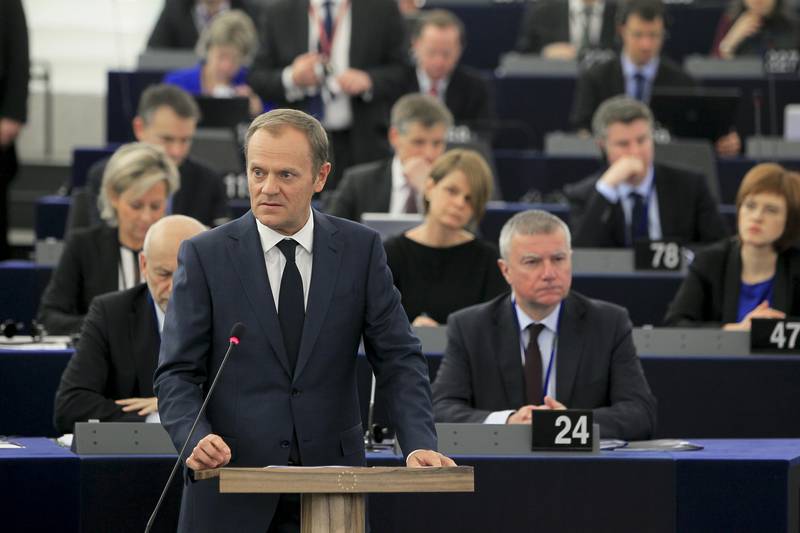 One of the greatest challenges for the EU in the coming years will not be the economy, although it is involved. Not even the geopolitical problems. The biggest challenge are the eurosceptic parties as a very general name. This was only hinted about during the European elections in May last year. Before that, the European Parliament acted as a second pillar of supranationality and deeper integration after the European Commission. You probably remember that the European Parliament's calls on the Union to stick to the community method instead of the intergovernmental method accompanied almost every debate in the plenary on an important for the EU issues. This was especially valid for the debates on the reform of the economic governance and the creation of the banking union.
One of the greatest challenges for the EU in the coming years will not be the economy, although it is involved. Not even the geopolitical problems. The biggest challenge are the eurosceptic parties as a very general name. This was only hinted about during the European elections in May last year. Before that, the European Parliament acted as a second pillar of supranationality and deeper integration after the European Commission. You probably remember that the European Parliament's calls on the Union to stick to the community method instead of the intergovernmental method accompanied almost every debate in the plenary on an important for the EU issues. This was especially valid for the debates on the reform of the economic governance and the creation of the banking union.
But now the situation is significantly changed. The new political season of the new parliament has begun in the autumn but the real work began in the end of last year when the election of a new Commission, new European Council president and a new highrep for foreign policy ended and the MEPs were able to return to their daily business. During the debates in the plenary, the statements are more and more often addressed to the national audience. Not only this but depending on who is facing the MEPs the debate entirely shifts in national direction. One sometimes has the feeling that they are attending a plenary of a national parliament, not the European parliament. Similar thoughts shared the correspondent of La Stampa in Brussels Marco Zatterin who wrote on Twitter during the first plenary session for this year in Strasbourg that when Renzi speaks the debate becomes Italian and when Tusk speaks it becomes Polish.
The same can be noted, for that matter, outside the European Parliament too. The press conferences of the Council also often are nuanced in national colours which is why at EU level national topics are being more frequently raised but the opposite is not true. The EU issues not only do not go in the national public debates but they become growingly scarce at EU level as well. And although the beginning of the debate with Donald Tusk was rather Polish, the discussion afterwards became ... British. The problem with the "nationalisation" of the European Parliament could be seen in the previous term as well when the parliament's leadership and individual MEPs often complained that the members of Nigel Farage's group hold the national flag on their seats which is against the supranationality of the institution they were elected in. Nigel Farage is currently a third term MEP who has entirely devoted his career to euroscepticism. To him, the EU is harmful and should break-up.
In the beginning, he was a single voice in the European Parliament against the EU as such and everyone were condescending to him. This has changed tangibly in the middle of his second term when his political party in Britain - the UK Independent Party (UKIP) - started to gain speed to such an extent that it has turned into a huge threat for the mainstream parties in UK. His influence has grown so much that Nigel Farage has turned into the real leader of Britain dictating the agenda of the ruling coalition of Conservatives and Liberals led by David Cameron. It is in this period when Britain registered probably its strongest distancing from the EU since the country joined in 1973. In the middle of this distancing is an explosive mix of David Cameron's ambitions to be Margaret Thatcher after more than a decade ruling of the Labour party and the growing popularity of UKIP.
The situation would have probably not be so impressive had Farage's rowdy vocabulary, masked under perfect English accent, and his anti-EU views not found fertile soil in many other EU countries. This has led to a significant change of the European Parliament profile. Not only that the most democratic institution of the EU has nationalised but it has also become quite profane. If before the statements were at worst just not worth remembering, now more and more often can be heard insulting and even dangerous statements.
Tusk - another Polish immigrant
The contrast now in the European Parliament between the pro-European forces and those who are eurosceptic or anti-systemic or purely xenophobic has become stronger. And under forces not just political groups should be understood but individual MEPs as well. This gives hope, to some extent, that the anti-systemic parties are not only incapable, still, to unite with each other but to also hold their own armies in order. A good example for this is the group of the European Conservatives and Reformists which is the third largest in the European Parliament, but voting on any important issue shows a complete lack of party discipline and unity. This means that the issues that divide them are more than those that united them. Will this change, we will see. It is certain, however, that the frustration among the mainstream parties is mounting.
On 13 January, in Strasbourg, Donald Tusk appeared for the first time in front of the MEPs to report on the achievements of the December EU summit. In principle, this is one of the important leverages of the European Parliament to put pressure on the member states to stick to the common EU agenda. And that debate was not an exception because most of the statements were related to Juncker's investment plan. But there was something different. On the one hand, many are first term MEPs and are quite inexperienced. This is one of the reason why the debate is nationalising instead of focusing on common EU issues. Another reason is that this was the first debate for Donald Tusk in his capacity as head of the European Council. And although this was not the first time he faced the MEPs - he addressed them when he was prime minister of Poland - now was different. The prime ministers or presidents usually do not fear the European Parliament because they are elected at national level and there is nothing to threaten them at EU level.
When you are part of the EU institutions, though, it is different because the expectations are much bigger than your term allows. This is usually a test for the supranationality which is becoming scarce in the EU today. Tusk was visibly uneasy but held a speech worth remembering. He briefly informed the MEPs why he wants the summits to be shorter and concise which did not impress the MEPs at all, excluding one or two. Then he presented the agenda of the European Council for the first six months which is a novelty and is a very good idea. In the end, Mr Tusk made it clear that he is aware of the changed situation not only in the world but in the European Parliament as well. He said that he still believed in Europe which was met with booing and ridicule by the eurosceptic groups. Donald Tusk does not have the self-confidence western leaders do. And although he is the first Eastern European leader elected at one of the highest positions in the EU, he aired the typical Eastern European uncertainty of people who consider themselves lower level than their western peers. The famous Eastern European complex. Who knows how many years will pass until this complex disappears.
Nonetheless, Donald Tusk continued presenting to the MEPs the Europe of his dreams. His Eastern European dreams: "I want a Europe of free citizens, united, internally secure, safe from external threats and confident about its future. We must remember that Europe is a real community of nations and peoples. That is why we must not be afraid of tensions among us. They are often productive and creative", he said. "I am sure in this room we have a difference of opinion on the cartoons of Charlie Hebdo. But as Europeans we share the fundamental view that no one has a right to use violence or murder people because they have a different religion or a different sense of humour. Just like, for instance, we have in this room different views about Russia and different interests with Russia. But no-one here, I deeply believe, will ever accept that a state invades and occupies the territory of another state or kills its citizens", the European president said.
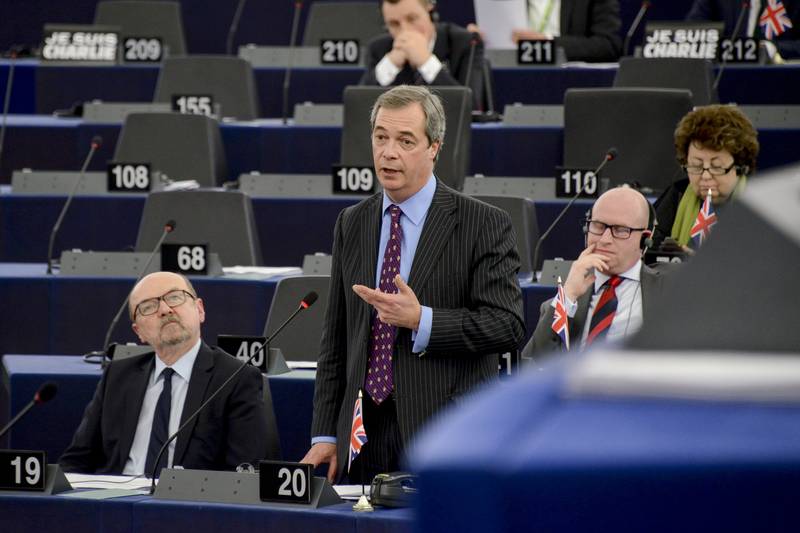 Alas, no one paid any attention to this. Be it because the MEPs had already put the masks Je suis Charlie in the very beginning of the plenary session on Monday or for other reasons but the issue about our system of values and our right to have different and often conflicting views remained unheeded. If it was not for Nigel Farage's statement, the debate would have been simply a usual boring debate, which is not an exception in Strasbourg. But Cameron's scarecrow took the floor. "I can see why they chose you. You're perfect. A completely out of date view of what Europe is and clearly you've learned absolutely nothing from the results of the European elections", Mr Farage said. Then he "educated" the new president of the EU on the situation in Britain and how immigration is the leading topic for the British public. He reminded Tusk that during his previous hearing in the European Parliament as premier of Poland he promised that less Poles would go to the UK.
Alas, no one paid any attention to this. Be it because the MEPs had already put the masks Je suis Charlie in the very beginning of the plenary session on Monday or for other reasons but the issue about our system of values and our right to have different and often conflicting views remained unheeded. If it was not for Nigel Farage's statement, the debate would have been simply a usual boring debate, which is not an exception in Strasbourg. But Cameron's scarecrow took the floor. "I can see why they chose you. You're perfect. A completely out of date view of what Europe is and clearly you've learned absolutely nothing from the results of the European elections", Mr Farage said. Then he "educated" the new president of the EU on the situation in Britain and how immigration is the leading topic for the British public. He reminded Tusk that during his previous hearing in the European Parliament as premier of Poland he promised that less Poles would go to the UK.
But this is not true and the reason is money, Farage said, bringing back to life the nightmare about the Polish plumber. "You're the newest Polish immigrant and you've gone from a salary of 60 000 euros a year to a salary of 300 000 euros a year. So, congratulations, you've hit the EU jackpot", the British politician concluded triumphantly. After him, somewhat natural sounded the statement not of anybody else but of a Polish non-attached member, Janusz Korwin-Mikke. He called the EU "a Brussels occupation", he called for restoration of the death penalty to enable people to kill Muslims and in the end he said that the EU must be destroyed. Against the backdrop of this, all the other statements about the benefits of the investment plan, the relations with Russia, the situation in Ukraine or for/against the euro were sunk infamously by the arrogance of the new reality in the European Parliament which is a mirror of the developments across the EU though a bit blurred.
Of course, MEPs immediately requested a punishment for the Polish member but Farage's statement passed because it was on the edge of what is tolerable. Or, may be, the new tolerable. Donald Tusk resisted the temptation and decided not to pay serious attention to Farage's arrogance saying only that this is a matter of political culture. In quotation marks, naturally. But his uneasiness was visible as well as the lack of "political culture" how to respond to such provocations, especially since he was praised by many, non-Eastern Europeans, for the Poland's achievements in the past 20 years and the deserved place of the former Polish premier as chief of the European Council.
They are not extreme right, they are extreme wrong
And although the eighth European Parliament is in its very beginning, the nerves are obviously already very strained. The impatience for the arrogant, insulting and often completely non-related to the agenda statements of pseudo parties is mounting. That impatience was articulated by the Swedish MEP Gunnar Hokmark (EPP) who used his speaking time to say that after he heard the shouts and statements from certain places it stroke him that the extreme rights are not right. "They are only extreme. Extremely wrong. I think this is the right name for them in the future. Their only ideas are contempt and disrespect for others. This is something that is so wrong and extreme so their name should be extreme wrongs", added the MEP coming from a country where a populist party has become a leading political power and succeeded to endanger the government.
"We must, indeed, oppose those extremes just as we must oppose the extreme left". You would be surprised but the words belong to Jonathan Arnott from Farage's group. He tried to convince his colleagues that UKIP is in fact a moderate party which is fighting for controlled migration. "Here, in this place, commitment to democracy is lacking", he said and quoted the European Commission chief as saying that the Greeks have to avoid "a wrong outcome" at the parliamentary elections. "This is unacceptable", the British MEP continued. To Donald Tusk all this was a huge surprise which he was not prepared for.
What to do with the extreme wrongs?
The question about the approach toward the new political reality was discussed a week later during the World Economic Forum in Davos. According to Mark Rutte, the Dutch Prime Minister, the reason for the birth of populist parties is the failure of the mainstream parties. "We have created the populists", he said. The Netherlands is among the first EU member states where nationalistic and xenophobic parties emerged. Mr Rutte believes, however, that no one should discuss anything with them. The direct dialogue with the electorate needs to be restored without any taboos. We need to be frank with the people and to explain to them, he added. His colleague from Finland disagreed with him. According to Alexander Stubb, these are not extreme right or extreme left. "I call them localists and globalists". Those are populists who have, however, improved their rhetorics with time and now say quite reasonable things about the economy and the foreign policy. "We discuss with True Finns. We have not isolated 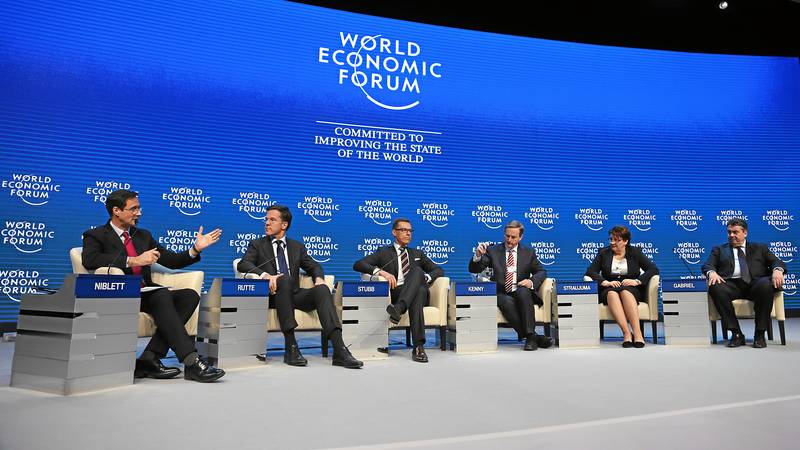 them and I think that works quite well". Sweden, he said, has isolated its Sweden Democrats. "Embracing populism in dialogue is the right way", Mr Stubb said.
them and I think that works quite well". Sweden, he said, has isolated its Sweden Democrats. "Embracing populism in dialogue is the right way", Mr Stubb said.
Ireland has still not clashed with the continental phenomenon, but all the same Prime Minister Enda Kenny said that the reasons for the mounting frustration is the lack of answers. "We need to focus on what can be delivered effectively", he recommended. Germany's Vice Chancellor Sigmar Gabriel was sobering as a true German. According to him, both Rutte and Stubb are right but they should not forget that the "elite dialogue" with politicians and the business is not the same as the talk at the breakfast table. We made a mistake in the past by ignoring the talk at the breakfast table, he admitted.
Another big mistake is that the political elites initially addressed with contempt and condescension the "sprouts of democracy" and now, when they are a real political force, which threatens not only their own seats but the EU as a project, the lack of an adequate answer is impressive. This is especially evident in the conversation about the Greek elections on 25 January. Democracy is the foundation of the EU, despite that it sometimes produces harmful for its own self products. And it seems that the new European president, Donald Tusk, is completely aware that this will be the greatest challenge in his term.
"There are some here who do not wish the Union well. Perhaps I could say I respect that, but I do not. If we undo the European Union, no-one will be freer. No-one will be better off. No-one will be safer.
I believed in Europe when the Polish Solidarity movement was born in 1980. I believed in Europe when the Wall came down in 1989. I still believed when I spoke here as Prime Minister in 2011. Dear members, I still believe in Europe today", Mr Tusk said. And what does Nigel Farage believe in? What do you believe in?
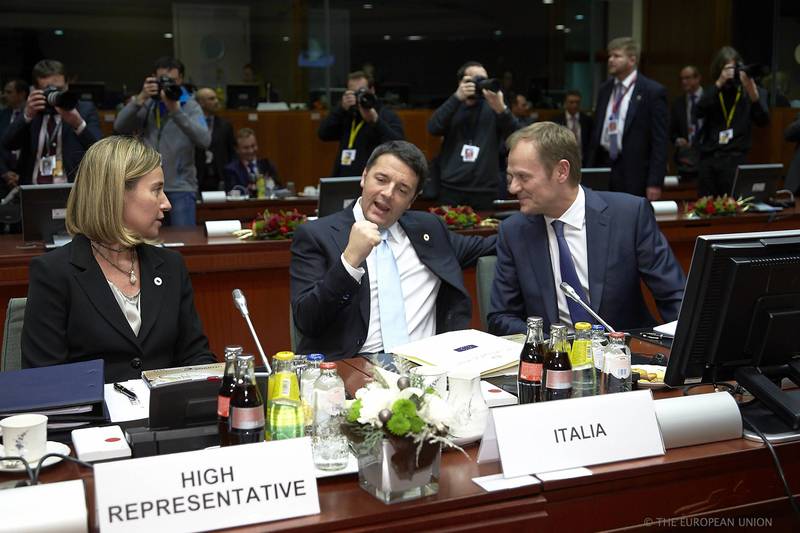 Mogherini, Renzi, Tusk | © European Council
Mogherini, Renzi, Tusk | © European Council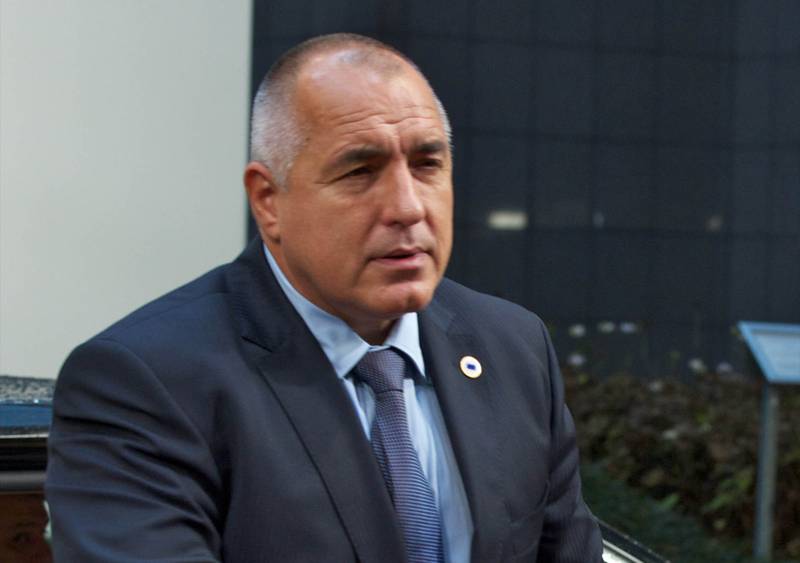 Boyko Borisov | © Council of the EU
Boyko Borisov | © Council of the EU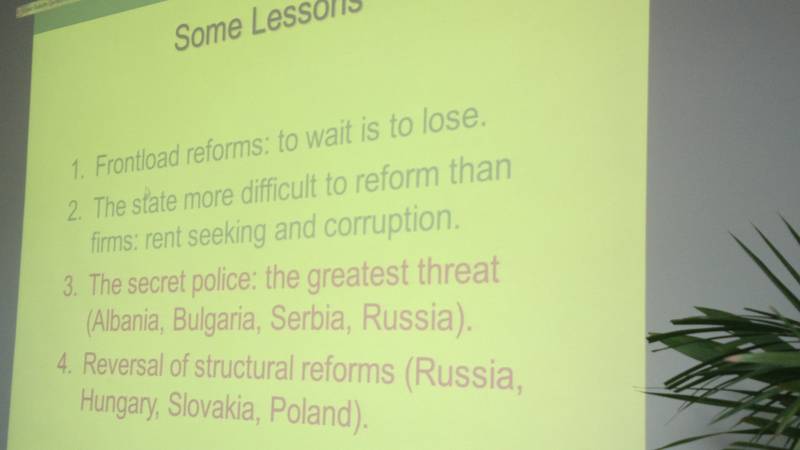 | © euinside
| © euinside